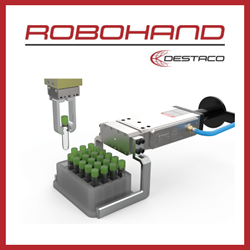NVIDIA and Alphabet’s Intrinsic Put Next-Gen Robotics Within Grasp
.jpg)
This week at the Automate trade show, in Chicago, Intrinsic is spotlighting leaps in robotic grasping and industrial scalability assisted by foundation models enabled by NVIDIA Isaac Manipulator, unlocking new value in industrial automation with AI.
NVIDIA unveiled Isaac Manipulator at GTC in March. Isaac Manipulator is a collection of foundation models and modular GPU-accelerated libraries that help industrial automation companies build scalable and repeatable workflows for dynamic manipulation tasks by accelerating AI model training and task reprogramming.
Foundation models are based on a transformer deep learning architecture that allows a neural network to learn by tracking relationships in data. They’re generally trained on huge datasets and can be used to process and understand sensor and robot information as magically as ChatGPT for text. This enables robot perception and decision-making like never before and provides zero-shot learning — the ability to perform tasks without prior examples.
NVIDIA’s collaboration with Intrinsic, a leading robotics software and AI company, demonstrates the potential for a universally applicable robotic-grasping skill to work across grippers, environments and objects.
“For the broader industry, our work with NVIDIA shows how foundation models can have a profound impact, including making today’s processing challenges easier to manage at scale, creating previously infeasible applications, reducing development costs, and increasing flexibility for end users,” said Wendy Tan White, CEO at Intrinsic, in a blog post announcing the collaboration with NVIDIA. (White will deliver a keynote address at Automate about what the rise of AI means for innovation and growth, on Thursday, May 9, at 7 a.m. PT.)
Developing Better Robot Grip With Isaac Manipulator
Grasping has been a long sought after robotics skill. So far it’s been time-consuming, expensive to program and difficult to scale. As a result, many repetitive pick-and-place conditions haven’t been seamlessly handled to date by robots.
Simulation is changing that. Enlisting NVIDIA Isaac Sim on the NVIDIA Omniverse platform, Intrinsic generated synthetic data for vacuum grasping using computer-aided design models of sheet metal and suction grippers. This allowed Intrinsic to create a prototype for its customer Trumpf Machine Tools, a leading maker of industrial machine tools.
The prototype uses Intrinsic Flowstate, a developer environment for AI-based robotics solutions, for visualizing processes, associated perception and motion planning. With a workflow that includes Isaac Manipulator, one can generate grasp poses and CUDA-accelerated robot motions, which can first be evaluated in simulation with Isaac Sim — a cost-saving step — before deployment in the real world with the Intrinsic platform.
Under the collaboration, NVIDIA and Intrinsic plan to bring state-of-the-art dexterity and modular AI capabilities for robotic arms, with a robust collection of foundation models and GPU-accelerated libraries to accelerate a greater number of new robotics and automation tasks.
On Tuesday, May 7, at 11 a.m. CT, NVIDIA Senior Research Scientist Adithya Murali and Intrinsic Chief Science Officer Torsten Kroeger will demonstrate the companies’ work in the session “Automating Smart Pick-and-Place With Intrinsic Flowstate and NVIDIA Isaac Manipulator ” in the Intrinsic booth 2808 at Automate. Join our speaking sessions at Automate.
Featured Product

